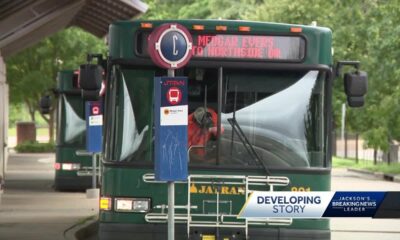Mississippi Today
Her grandfather helped bring Medicaid to Mississippi 55 years ago. Today, she’s pushing for expansion.
Supporters of Medicaid expansion would argue that it is wholly appropriate that Leah Hendrix has recently been a featured speaker in rallies at the state Capitol in favor of providing health care coverage for primarily working poor Mississippians.
No doubt, her activism brings symmetry.
Hendrix, a Jackson mother of four and the wife of a physician, is the granddaughter of Alton Cobb, the state's former longtime state health officer who played a pivotal role in Mississippi opting into the original Medicaid program 55 years ago.
In more recent times, her father, Tim Alford, a Kosciusko physician, was beating the drums in favor of Medicaid expansion longer than almost any other Mississippi health care provider.
“He said he was leaving that to me because no one had listened to him,” she joked in an interview with Mississippi Today this week after one of the Capitol rallies.
Medicaid expansion has become the major focus of a contentious 2024 legislative session, with hundreds of Mississippians, top state business leaders, health officials and even religious leaders publicly advocating at the Capitol for full Medicaid expansion that stands to significantly help the poorest, unhealthiest state in the nation.
For the first time, state lawmakers are earnestly debating expansion. Hendrix has been on the front lines of the fight to get it across the finish line.
“It seems we have been talking about this for more than 13 years,” she said, referring to the fact that the Affordable Care Act was passed in 2010 with the provision allowing Medicaid expansion to cover those earning up to 138% of the federal poverty level or about $20,000 annually for an individual. “But it really has been going on much longer than that. When did Al work on that?”
READ MORE: Top Mississippi business leaders endorse full Medicaid expansion
The story of Alton Cobb and Mississippi's reluctant decision to opt into Medicaid in 1969 is one of an unlikely alliance and political courage by a governor who eschewed his political philosophy to do what he believed was right for the people of Mississippi.
That governor was John Bell Williams. And Cobb, an employee at the state Department of Health who was initially reluctant to take a key position on Williams' staff, helped the governor reach that decision.
“I didn't vote for him,” Cobb told Mississippi Today in 2019, recalling when he was approached to work for Williams. “I think he probably knew that.”
But former U.S. Rep. David Bowen, who had joined Williams' staff, was a friend of Cobb and convinced him of the potential of Williams' health advisory board.
“I wanted to be part of that,” Cobb said.
READ MORE: Is history repeating itself on Medicaid expansion in Mississippi?
The panel held hearings across the state, listening to health care providers and others. Cobb said Williams attended the meetings, though he seldom spoke. He primarily listened.
At the end of the process, Williams informed his staff he was calling a special session to take up the issue of opting into the Medicaid program. That special session lasted from July 22, 1969, until Oct. 10. In the midst of the long and extraordinary session, Hurricane Camille ravaged the Mississippi Gulf Coast.
But by the end, Mississippi opted into the Medicaid program as most other states had already done.
The Williams-backed move was a shock to many political observers. As a U.S. House member prior to being elected governor, Williams had voted against the legislation to create the Medicaid program and had campaigned for governor railing against the excesses of the federal government.
But in a joint session of the Legislature on the first day of the special session, he told members, “In fairness, I must point out that my philosophical reasons for resisting the program as a member of the United States Congress is neither relevant nor applicable to the present issue before us. The program is a reality. It is available to our state and now devolves wholly into a question of whether you, in your wisdom, should determine our participation will be in the best interests of our state and people.”
Back in 1969, Williams' argument for opting into the original Medicaid program sounded much like the one made today for Medicaid expansion. He said the program would provide health care for a segment of the population that needed it, it would help the state's health care providers, and it would benefit the whole state by pumping more funds into the economy.
“Al used to love to tell about becoming John Bell Williams' chief ambassador for starting Medicaid in Mississippi,” Hendrix said. “… After having several meetings, a light came on for Williams.
“… Two opposites politically flew around the state (on the state plane) selling Medicaid,” Hendrix continued. “Al did not like to fly.”
But she added it was “a good example of a politician who did a 180 because it just made economic sense.”
Hendrix said her grandfather, who died in 2021, wanted his support for Medicaid expansion to be included in his obituary.
Hendrix is hopeful that current Mississippi politicians will do as Williams did back in 1969 and set aside their previous political beliefs and do what is right for the people of Mississippi.
“Despite the stereotypes, Medicaid does so much good,” she said. “This is the insurance that helps children who have no other choice. Where are the Beatitudes when our neighbors need them? I will never understand why Mississippi politicians of late have decided we should not expand — turning down millions of federal dollars our state so desperately needs because of politics while we're all still paying into a system that's funding states that did expand.”
Perhaps today's politicians need someone like Alton Cobb to help them reach that decision. Maybe that person is already part of the debate and is advocating for it at the Capitol every day — if only those Mississippi politicians would do like John Bell Williams did in 1969 and listen.
READ MORE: Medicaid expansion negotiators still far apart after first public meeting
This article first appeared on Mississippi Today and is republished here under a Creative Commons license.
Mississippi Today
Renada Stovall, chemist and entrepreneur
Renada Stovall sat on the back deck of her rural Arkansas home one evening, contemplating life when she had a life-altering epiphany…
“I gotta get out of these woods.”
She heard it as clear as lips to her ear and as deep as the trees surrounding her property. Stovall's job as a chemist had taken her all over the country. In addition to Arkansas, there were stints in Atlanta, Dallas and Reno. But she was missing home, her parents and friends. She also knew, she needed something else to do.
“I thought, what kind of business can I start for myself,” said Stovall, as she watered herbs growing in a garden behind her south Jackson home. Some of those herbs are used in her all-natural products. “I know when I lived in Reno, Nevada, where it's very hot and very dry, there really weren't products available that worked for me, my hair, and my skin suffered. I've got a chemistry degree from Spelman College. I took the plunge and decided to create products for myself.”

In 2018, Stovall's venture led to the creation of shea butter moisturizers and natural soaps. But she didn't stop there, and in December 2022, she moved home to Mississippi and got to work, expanding her product line to include body balms and butters, and shampoos infused with avocado and palm, mango butter, coconut and olive oils.
Nadabutter, which incorporates Renada's name, came to fruition.

Stovall sells her balms and moisturizers at what she calls, “pop-up markets,” across the state during the summer. She's available via social media and also creates products depending on what of her ingredients a customer chooses. “My turmeric and honey is really popular,” Stovall added.
“The all-natural ingredients I use are great for conditioning the skin and hair. All of my products make you feel soft and luscious. The shea butter I use comes from West Africa. It's my way of networking and supporting other women. And it's my wish that other women can be inspired to be self-sufficient in starting their own businesses.”





This article first appeared on Mississippi Today and is republished here under a Creative Commons license.
Mississippi Today
On this day in 1954
MAY 17, 1954

In Brown v. Board of Education and Bolling v. Sharpe, the U.S. Supreme Court unanimously ruled that the “separate but equal” doctrine in Plessy v. Ferguson was unconstitutional under the 14th Amendment, which guaranteed equal treatment under the law.
The historic decision brought an end to federal tolerance of racial segregation, ruling in the case of student Linda Brown, who was denied admission to her local elementary school in Topeka, Kansas, because of the color of her skin.
In Mississippi, segregationist leaders called the day “Black Monday” and took up the charge of the just-created white Citizens' Council to preserve racial segregation at all costs.
This article first appeared on Mississippi Today and is republished here under a Creative Commons license.
Mississippi Today
Every university but Delta State to increase tuition this year
Every university in Mississippi is increasing tuition in the fall except for Delta State University.
The new rates were approved by the governing board of the eight universities, the Institutions of Higher Learning Board of Trustees, at its regular meeting Thursday.
The average cost of tuition in Mississippi is now $8,833 a year, a roughly 3% increase from last year. Students can expect to pay tuition ranging from $7,942 a year at Mississippi Valley State University to $10,052 a year at Mississippi State University.
In recent years, universities have cited inflation and rising insurance costs as reasons for the tuition increases. At Thursday's meeting, the board heard a presentation on how property insurance is becoming more expensive for the eight universities as Mississippi sees more tornadoes and storms with severe wind and hail.
READ MORE: Tuition increases yet again at most public universities
But it's an ongoing trend. Mississippi's public universities have steadily increased tuition since 2000, putting the cost of college increasingly out of reach for the average Mississippi family. More than half of Mississippi college students graduated with an average of $29,714 in student debt in 2020, according to the Institution for College Access and Success.
At Delta State University, the president, Daniel Ennis, announced that he will attempt to avoid tuition increases as the regional college in the Mississippi Delta undergoes drastic budget cuts in an effort to become more financially sustainable.
“We will resist tuition increases so that our most economically vulnerable students can continue to have access to the opportunities that a college degree can provide,” he wrote in a memo to faculty and staff on Monday. “We will move beyond basic survival and into a place where we have the capacity to take better advantage of our undeniable strengths.”
Delta State didn't increase tuition last year, either. Officials have been concerned the university is becoming too pricey for the students it serves.
Tuition for the 2024-25 academic year, by school:
- Alcorn State University: $8,105
- Delta State University: $8,435
- Jackson State University: $8,690
- Mississippi State University: $10,052
- Mississippi University for Women: $8,392
- Mississippi Valley State University: $7,492
- University of Mississippi: $9,612
- University of Southern Mississippi: $9,888
This article first appeared on Mississippi Today and is republished here under a Creative Commons license.
-
SuperTalk FM5 days ago
Martin Lawrence making 3 stops in Mississippi on comedy tour
-
Our Mississippi Home3 days ago
Beat the Heat with Mississippi’s Best Waterparks
-
Our Mississippi Home4 days ago
Charlie’s U-Pik: Opening Soon for the Summer Season
-
Mississippi News Video7 days ago
Local dentists offer free dental care in Amory
-
Kaiser Health News4 days ago
Medicaid ‘Unwinding’ Decried as Biased Against Disabled People
-
Mississippi News Video3 days ago
Jackson has a gang problem
-
SuperTalk FM13 hours ago
State auditor cracking down on Mississippians receiving unemployment benefits
-
Mississippi Today7 days ago
On this day in 1968





































